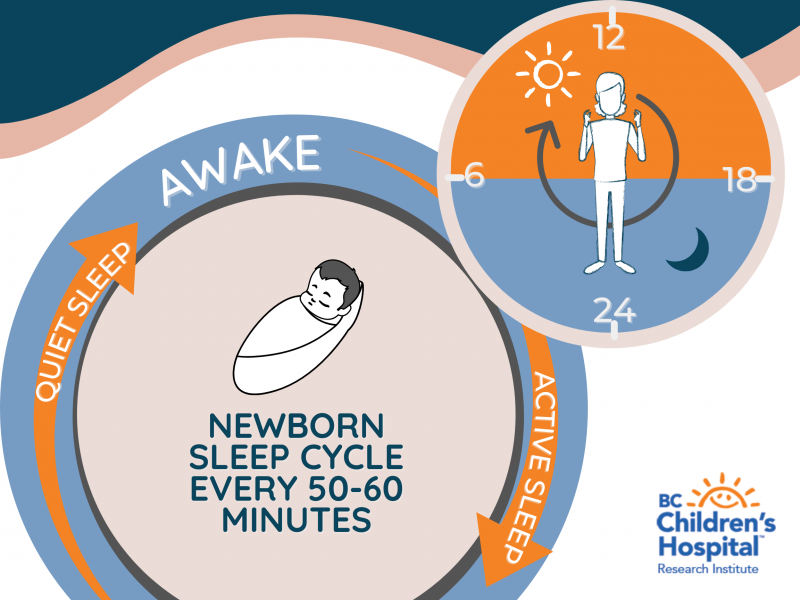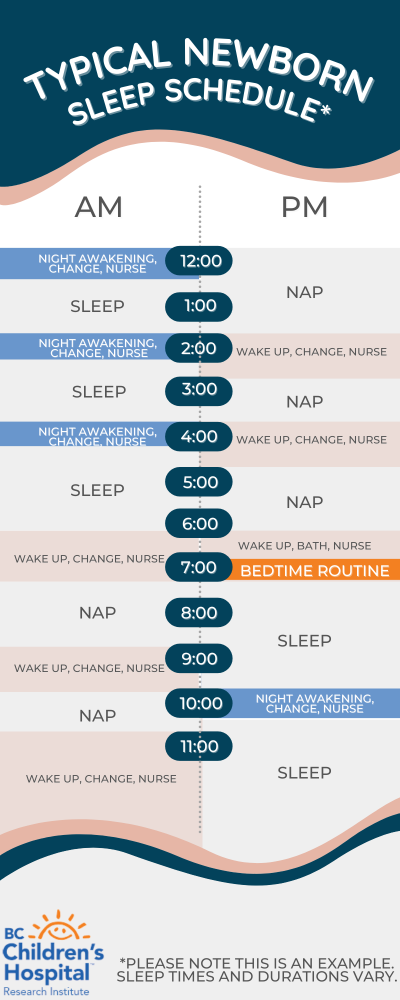Newborns (0 – 4 months)
Most parents are aware that newborn babies have a different sleep schedule compared to adults. But what differences are normal for newborn babies, and what can you expect for the first four months or so as a parent?
Sleep Architecture
Newborn babies are born without a circadian rhythm (daily sleep cycle), meaning that their body is not yet trained to fall asleep regularly as adults do. Usually, the newborn is simply sleeping when they get tired, which is part of the body’s self-regulating or homeostatic response. This is a major reason why newborn and infant sleep patterns seem so irregular compared to adults.
Newborns, however, do not have unstructured sleep, as their sleep is still divided into a semi-organized sleep cycle, which is present at birth in infants born at term. Sleep in newborns takes place in cycles of roughly 50-60 mins, in which the newborn is either in active sleep or quiet sleep, with some small transition states known as indeterminate sleep. Preterm infants tend to have even less structured sleep, but by the time they reach term, the active-quiet sleep cycle is present.
Click on the graphic below to view the enlarged image.
Sleep Environment
Newborn babies are rapidly adapting to their environment outside the womb, and this includes the entrainment of the circadian rhythm or day-night cycle. Over the first four months, newborns begin to respond more strongly to the day-night cycle as well as changes in lighting in their environment. Evidence of the circadian rhythm starts to emerge at around 2-3 months but is not normally fully developed until after the first year. Experiencing these changes in lighting throughout the day is important for helping to entrain the circadian rhythm.
There is debate over whether it is beneficial for newborns to sleep in the same room or bed as their parents (co-sleeping), with recent evidence suggesting that it is more beneficial for newborns and infants to sleep in a separate room from their parents.
Sleep Behaviour
On average, newborns sleep for around 16-17 hours of the day. This usually consists of three daytime naps on average, as well as several bouts of sleep during the night. It is normal for newborns to awaken at several times during the night, as their sleep cycle is not solely taking place at night. On average, newborns will awaken 2-3 times per night, and these awakenings last roughly 45-90mins each.
Initially sleep is usually organized around feeding times, but this gives way over the course of time to the circadian rhythm. The circadian rhythm is usually entrained by “zeitgebers” (time-givers) which the body uses to approximate the time of day, usually through relative levels of light and dark. While sleep generally takes place in multiple bouts over the course of a 24-hour period for newborns (polyphasic sleep), newborns slowly begin to consolidate their sleep to nighttime at around 2-3 months.
Click on the graphic below to view the enlarged image.
Role of Sleep in Development
At this stage, a newborn baby is rapidly trying to adapt to its environment outside the womb. The main developmental change in the first four months of life is the development of the light dark cycle and beginning to tolerate longer periods of wakefulness. This process continues into infancy and throughout early childhood, but development begins in the first four months.
There have been many interesting findings regarding the role of sleep in the psychological development of newborns. It has been reported that 3-month-old infants required a nap to remember a cartoon face for longer than 1.5-2 hours, and that sleep was required to consolidate the memory due to the age of the baby. Researchers have also reported that newborns display the ability to learn during sleep, which also suggests that newborns must rapidly adapt to their environment, even during sleep.
The focus of parents at this stage when it comes to sleep should be ensuring that their newborn is getting enough sleep and sleeping safely. The quality of sleep that a child displays over the first four months of life can be a warning sign of future issues with sleep, which can lead to emotional, and psychological development issues. A major concern at this stage is also Sudden Infant Death Syndrome (SIDS). Parents can take steps to give their child a safe sleeping environment to decrease the likelihood of SIDS. For more information, see the resources below.
Resources
If you think your newborn is displaying signs of abnormal sleep, please consult the following resources.
There’s a Monster in My Closet is a website that offers sleep education programs for kids over the first five years of life. For more information on better approaches to sleep and proper sleep hygiene, click on the button below to visit their website.

